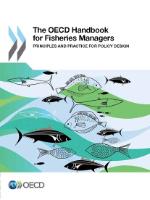Fisheries
The OECD Handbook for Fisheries Managers
|
|
Drawing upon a decade of OECD work, this handbook describes the challenges facing fisheries and points ou practical solutions. It shows how market-based approaches, clear objectives and rigourous policy design processes can lead to more profits for fishers and better sustainability for our shared ocean resources. This handbook will be of use to policy professionals, civil society groups and anybody who is concerned about fishing and the health of our oceans. Executive Summary Access for government officials with OLIS accounts Contact person: Roger Martini (roger.martini@oecd.org) |
Key points
|
Further Reading
Rebuilding Fisheries: The Way Forward
Fisheries and Aquaculture Certification
The Economics of Rebuilding Fisheries: Workshop Proceedings
Reducing Fishing Capacity: Best Practices for Decommissioning Schemes
Related Documents
